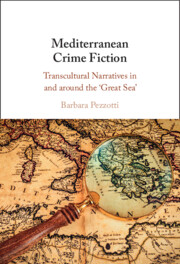Book contents
- Mediterranean Crime Fiction
- Mediterranean Crime Fiction
- Copyright page
- Contents
- Figures
- Acknowledgements
- Introduction
- Chapter 1 The Mediterranean Detective
- Chapter 2 The Mediterranean City
- Chapter 3 Food for Thought in Mediterranean Crime Fiction
- Chapter 4 Crime Fiction and the Past
- Chapter 5 Identity in Mediterranean Crime Fiction
- Chapter 6 Male Gaze and Gender Violence in the Mediterranean Crime Novel
- Conclusion
- Bibliography
- Index
Chapter 4 - Crime Fiction and the Past
A Mediterranean Desencanto
Published online by Cambridge University Press: 09 November 2023
- Mediterranean Crime Fiction
- Mediterranean Crime Fiction
- Copyright page
- Contents
- Figures
- Acknowledgements
- Introduction
- Chapter 1 The Mediterranean Detective
- Chapter 2 The Mediterranean City
- Chapter 3 Food for Thought in Mediterranean Crime Fiction
- Chapter 4 Crime Fiction and the Past
- Chapter 5 Identity in Mediterranean Crime Fiction
- Chapter 6 Male Gaze and Gender Violence in the Mediterranean Crime Novel
- Conclusion
- Bibliography
- Index
Summary
Chapter 4 argues that by being imbued with a complex transnational identity that predates the formation of the current nation-states, the Mediterranean detective investigates the processes of democracy and rhetoric of nationhood from a disenchanted perspective. A common history of colonialism, dictatorship and a difficult transition to democracy have spurred Mediterranean crime authors to problematise periods of political uncertainties during which Mediterranean peoples had to adjust to a recently gained liberty and overcome the trauma of dictatorship. Typically, through the investigative act, Mediterranean narratives highlight an historical ‘short circuit’, related to the passage from different forms of dictatorship to democracy, which has lasting effects in terms of illegality and corruption on the present. Indeed, these narratives imply that the disturbances of the present day can only be understood in reference to the events that led to a flawed decolonisation or democratisation. This chapter also shows how some authors return to the very origin of the new state and expose the violence, illegality and exclusionary practices that lay at the core of their foundation.
Keywords
- Type
- Chapter
- Information
- Mediterranean Crime FictionTranscultural Narratives in and around the ‘Great Sea', pp. 120 - 145Publisher: Cambridge University PressPrint publication year: 2023



